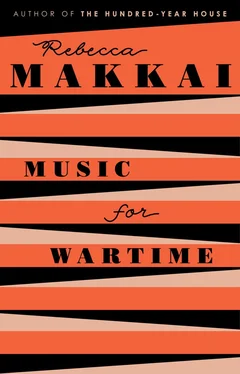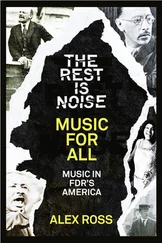Peter told me this the next week over lunch. Actually, he told me many times, over many lunches in the following year, as if through the retelling he could undo something. We met every other Thursday at the Berghoff, where he’d have root beer and I’d have two pale ales and we’d both eat enormous plates of bratwurst and chicken schnitzel and noodles with butter sauce. We had set these lunches up two years earlier, quite formally. We’d been in and out of touch for ages when we found ourselves alone on the living room futon of a boring party in Hyde Park, drunk, wondering aloud if knowing each other when we had acne was the reason we’d never dated as adults. We had kissed just once, sophomore year, after a SADD meeting when we stayed behind to pick up the leftover fliers. I didn’t know he was gay. I hardly knew I was. He came over with the green fliers in a stack as if to hand them to me, but when I took hold of the papers he pulled them back and me with them. The only person I’d ever kissed before was a girl named Julie Gleason. Afterward he said, “You’re pretty dense, aren’t you?” That was it. We didn’t talk for two weeks, and then we were best friends again, before the paper cuts on my palm had even fully healed.
I had looked at him that night at the party — beautiful and grown-up, a beer bottle sweating against the leg of his jeans — and said, “I never see you anymore.”
“Yes, I’m slowly becoming invisible.” Peter was the kind of guy who would try for any joke, any chance to flash his perfect teeth. Even when it wasn’t funny, you had to appreciate the showmanship. And then he looked at me seriously, which was rare at the time. “We should get together and talk. I mean regularly, because I miss you. It would be like therapy.” I should have known I would always be the therapist. I told him once that he was the Gatsby to my Nick Carraway. He said, “Yes, but I throw much wilder parties.”
And like stupid little Nick, I ended up trying to fix things. If I hadn’t spent American Lit distracted by Zach Moretti and his amazing forearms, I might have registered that these stories never end well.
Let me say, Peter had been brilliant. Chicago breeds its own stage stars, who stay local even if they’re good enough to go to New York, and he was one of them. When I saw his Hamlet at Chicago Shakespeare, all memories of Mel and Lord Larry vanished in a celluloid fog. He was the right age, the right build, and those eyes could turn like lighting from irony to terror. I wonder how that colored our friendship, that I saw him simultaneously as both Peter and Hamlet. If nothing else, it made me more tolerant of his ramblings.
After the day he froze (“The Day of Which We Shall Not Speak,” he called it whenever he spoke of it, which was constantly), he took sick leave for a week, then tried again. If anything, he was worse. He quit before they could fire him, and spent the next two months looking for work. He walked into each audition knowing everyone in the room had heard about his big dry-up. His agent dropped him, and so did his boyfriend.
A few months later, Peter moved near Milwaukee and took a job doing dinner theater, and our lunches became less frequent. In late November 2005, almost a year after The Day of Which We Tended to Speak Obsessively, we sat by a window in the Berghoff and watched the year’s first snow collect in the street. He told me about his new role as Bob Cratchit in something called Let’s Sing a Christmas Carol! The director wanted British accents from everyone. Peter could do a perfect one, of course, but not without sinking further into the hollow cadences, the glazed eyes, the strangling sense of the ridiculous.
“Most of them sound southern, it’s terrible,” he said. He was on caffeine today or something worse. He was literally bouncing on the springy seat of the booth. “The eleven o’clock number is, I shit you not, called ‘God Bless Us Every One.’ Jesus Christ, you should hear it, it sounds like Scrooge drops by Tara for pecan pie.” Every time I saw him he talked faster, as if he were running out of time. He still flashed the smile, but perfunctorily, as if displaying his incisors for the dentist.
When our food came, he finally asked me a question so he could stop talking and eat his schnitzel. “How’s life in phone-a-thon land? Are you giving away thousands of tote bags?”
I was the special events coordinator for Chicago Public Radio, and for several years before we officially reconnected, Peter and I would run into each other in the restaurants of the monstrous tourist trap on Navy Pier where Chicago Shakespeare and WBEZ both live. Once, after we’d drifted apart for a few months, our lunch parties at Riva joined together, and when someone introduced us and said we might hit it off, we started laughing so hard Peter dropped his wineglass.
“We’re doing better than last year,” I answered.
“I’ve been telling everyone in the Land of Moo about the Republicans trying to shut you down. I’m going to assemble an army of cheeseheads for your defense.”
“Thanks, Peter. That’s thoughtful.”
He started mixing all the food on his plate: schnitzel, potato, creamed spinach, kraut.
“So, what about trying my shrink?” I said. “She’s good. I wouldn’t lie to you.”
The old Peter would have cued up his German psychiatrist impersonation, drawing the attention of everyone around, but the new Peter just stared at his mixed-up food. “She might be good, but how far is she from Kenosha, Wisconsin, the epicenter of the theatrical world?”
“She’s here in the Loop, and that would be good for you.”
He agreed to call her and then told me about his great-uncle, who, after undergoing electroshock, became obsessed with licking copper objects. I wanted him to ask about me, to ask about Carlos, who was moving out of my apartment in gradual increments and breaking my heart in painful slow motion, leaving me for the jazz singer we used to go see every few weekends at the Back Room until I finally realized the guy’s bedroom eyes were directed not at the whole room but at the seat next to mine in particular. I’d have to find someone else to complain to.
“Listen, though,” said Peter, “I’m on the mend. If I had more serious roles again, that might do it. I mean, I was never a comedian, and that’s what they’re asking me to do.”
As much as I didn’t believe his optimism, I was glad he wasn’t giving up. I constantly pictured him hanging himself from the closet rod of his cold little apartment, or drinking something medieval and poisonous. Maybe I’d just watched his Romeo too many times.
“I’ve got an offer for you,” I said. I’d thought about it in the car on the way there, and decided I couldn’t ask him. I decided it several times, in fact, but now here it was, coming out of my mouth. “I want you to do some work for me.” He nodded, eyes wide, as he mashed his food and listened to me explain the project: In cooperation with the Art Institute, we’d commissioned twenty local poets and authors to write short works relating to the museum’s crown jewels — a mystery writer casting Van Gogh’s Bedroom at Arles as a crime scene, a Pulitzer-winning poet extolling Picasso’s man with the blue guitar in sonnet. Richmond Barthé’s sculpture The Boxer got a prose poem that shattered my heart, one I wanted to frame and wear around my neck. The writing would hang beside the art, and my job was to find actors to read a few of the pieces aloud at the gala opening and then record them all for NPR and for the museum audio tour that people could rent with headphones. My brilliant idea had launched a yearlong nightmare of collaboration with a hateful little man I’d come to call Institute Steve, the only unlovely person on the entire museum staff. “It’s December thirtieth, if your show is done. The thing is,” I said, grabbing for the only available out, “the other actors might be people you knew.”
Читать дальше












